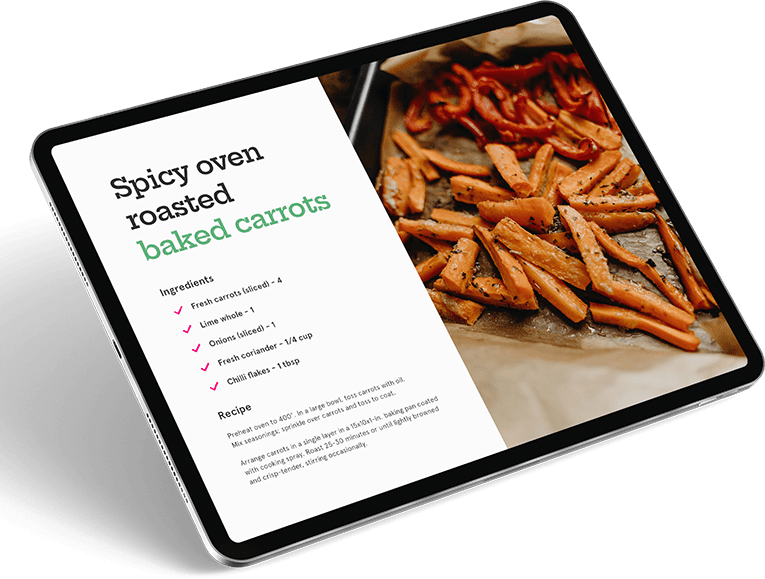Recipes, recipes, recipes. They’re so easy to find online. If you search right now, you can get over 1.5 million results for “oatmeal carrot muffins.”
Many of the recipes will be pretty much exactly the same. Some will be unique. Where do yours fall? It’s common practice for bloggers to find recipes online and adapt them for publishing on their own sites. And really, it’s common practice for just about ANYONE cooking to grab a recipe and make it their own based on their preferences, the ingredients they have on hand and so forth.
Adaptation is a great way to come up with new and exciting creations. But before you run off grabbing recipes online, rewording them slightly, and then publishing them…let’s talk about this a bit more.
The Legal Aspects of Adapting Recipes
We aren’t lawyers by any stretch of the imagination and this shouldn’t be considered legal advice, but rather something for your general information. Please do your own research, consult a legal professional, and proceed accordingly.

Here’s the lowdown…
Ingredient lists are not under copyright protection (source). However, personal expression added to these instructions do make a recipe article subject to copyright protection, so copying and pasting is certainly very dangerous ground…legally speaking. We haven’t even discussed the relationship aspect of this and that will come later.
But recipe copyrights are a little more complicated than these simple facts. For instance, you can’t copy recipe compiliations or collections, such as in a cookbook. Even if these were composed of straightforward instructions and ingredients, presenting them together might infringe on someone else’s expression under copyright law.
If you want to use a photo from the original food site for your curated recipe, you need to ask permission to do so first. Many people don’t, but copyright lawyers will tell you that online infringement cases are rapidly on the rise—especially with graphics.
In regard to recipe titles, similar logic follows. A recipe title like “Chickpea and Pineapple Couscous” is not a copyrighted since it is composed strictly of ingredient names. However, “Marvela’s Mahhhvelous Couscous Cascade” is a personal expression; meaning you shouldn’t use that title—even if you change other things about the recipe.
Acceptable Ways to Use Other People’s Recipes
You can duplicate someone else’s recipe on your blog in three legal ways:
- Getting permission to reproduce it exactly—usually with a credit or link. This is the safest way to present someone else’s recipe… but it’s not always the most imaginative way. However, it might be a great way to make a new connection with a fellow food blogger and that’s a great thing.
- Curating the recipe—Presenting a little snippet about the recipe, with your own thoughts added and linking back to the recipe is perfectly acceptable and is great publicity for the recipe publishing site.
- Adapting the recipe— This involves giving the recipe a unique title, modifying the ingredients to your own preferences and/or cooking it in a different way. But go the extra mile on this method and link back to the original recipe with an “adapted from” credit. It’s common courtesy and again, is a great way to start building connections with others with similar interests.
When in doubt, always ask permission. Explain exactly why you want to reproduce a recipe and show the benefit this will bring the site owner and her readers. For example, “it’s the best version of Shepherd’s Pie I’ve ever tried, and I’d like to tell my readers about it.”
And really, it’s just good manners to ask permission. Say something like: “I’d like to feature your recipe in summary form…” or “I’d like to include your recipe in this month’s collection of…” Be sure to give the site owner adequate time to respond.
Of course, you don’t always have to ask permission, but it’s just courteous to do so. It also tips you off to overly-touchy or possessive site owners, if they say “no” treat it as big, fat warning sign you might be sued over something. There are plenty of other recipe publishers that are happy to work with you, so move on.
Instead of Adapting, Try Testing and Sharing
If you see the perfect recipe you’d like to try on another website, there’s no need to try to mix up the ingredients and try to reword things just to make it look like you created the recipe. One of the easiest ways to create great content for your readers is to test the recipe, take some photos and share your experience with your readers. Then link to the recipe.
More Tips on Adaptation: Making a Recipe Your Own
Adapting the recipe completely is a safe approach, whenever possible, test your recipe first. If you can’t test it, you may as well simply curate the recipe by introducing it and link to the original source, so your readers can try it out themselves. When adapting a recipe, make the recipe your own by giving it a personal twist. Tell an anecdote about the time you were caught in a snowstorm in 2002 and it was the only thing you had to eat for three days—but you didn’t get tired of it. Or before presenting your “Lisa’s Ultimate Lime Chiffon Pie”, tell about the time you were pregnant with your twins and you tried every lime recipe you could get your hands on. Or talk about how you discovered that anchovies were the perfect substitute for steak sauce in your “Surf ‘n’ Turf Tornado.”
It’s a win-win for all.
You get to taste some awesome food. You readers are introduced to your experience and a great recipe. The original recipe creator gets credit for her hard work. And then, at the end of it all, you get the praise and loyalty from your audience that loves the content you share. Plus, you create goodwill with the original recipe creator and open the doors to a more cooperative business relationship.
Build Your Community
No matter how you approach using other people’s recipes, never be afraid to give another food blogger credit–even if you’ve adapted their cake recipe significantly to suit your gluten-allergic daughter.
Above all, food blogging is all about community. (Did you know you can connect with nearly 1,600 (and counting!) food-loving bloggers in our FREE private KitchenBloggers Facebook community? Check it out here!)
Your readers and as your fellow site owners will appreciate the added value your honesty and generosity brings. They will trust your recipes, bookmark your site—and visit you again and again.


